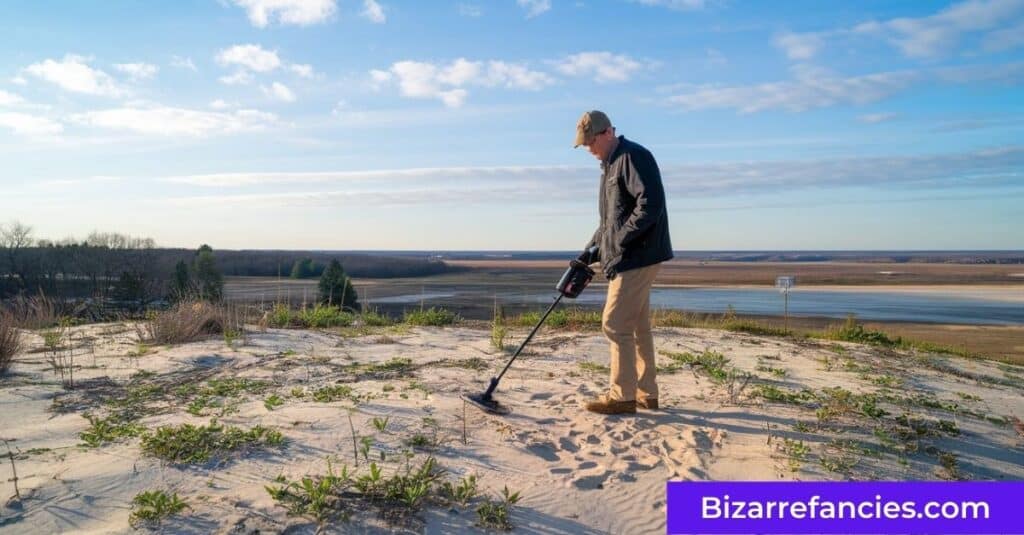Metal detecting in New Jersey offers a fascinating blend of history, adventure, and potential treasure. Whether you’re strolling the state’s beaches, exploring its public lands, or investigating ghost towns, there’s a sense of anticipation in every swing of your detector. But to get the most out of your treasure hunting experience, it’s essential to know the laws, best locations, and tips for success. This ultimate guide for 2024 will provide you with everything you need to know about metal detecting in New Jersey.
Metal Detecting Laws in New Jersey
Before embarking on your treasure hunting adventure, it’s critical to familiarize yourself with metal detecting laws in New Jersey. The state has regulations to protect historical sites, relics, and sensitive areas from unauthorized digging and artifact removal.
State Laws and Regulations
In New Jersey, metal detecting is legal in most public places like parks and beaches, but there are important exceptions. Historical sites, state parks, and areas under the jurisdiction of the federal government are strictly off-limits unless you obtain a permit. Many state parks restrict metal detecting to certain areas or require prior approval.
When it comes to public lands in New Jersey, always check the local rules before you start. Violating these laws can result in heavy penalties, including fines or confiscation of your equipment. For example, metal detecting on a known archaeological site without permission can lead to serious legal consequences.
“The best advice for New Jersey metal detectorists is to always check with the local authorities before beginning any treasure hunt.” – NJ Historical Society
Federal Laws: ARPA

On a federal level, the Archaeological Resources Protection Act (ARPA) governs the use of metal detectors on federal land. ARPA prohibits the removal of artifacts that are more than 100 years old from public lands without a permit. This includes historical relics such as coins, tools, and even bullets.
Permits and Permissions
Permits are often required for detecting in certain parks or historic areas. If you’re planning to metal detect on private property, always ensure you get written permission from the landowner. Having documentation could save you from potential legal issues down the line.
Quick Facts: Metal Detecting Laws in New Jersey
| Type of Land | Permission Needed? |
| Public Beaches | No, but follow local rules |
| State Parks | Yes, often restricted |
| Historical Sites | Yes, strictly regulated |
| Private Property | Yes, always with written consent |
Is It Legal to Metal Detect in New Jersey?
Yes, metal detecting is legal in many areas of New Jersey, but there are restrictions. As discussed earlier, you cannot metal detect in areas that are protected due to their historical or archaeological significance, and certain state parks require a permit.
Public vs. Private Lands
Detecting on public lands is generally acceptable, but public parks may have specific rules you need to follow. NJ Beaches are some of the most popular spots for metal detecting, especially early in the morning or after a storm when new treasures may have washed ashore.
Detecting on private lands is allowed if you have explicit permission from the landowner. This is an excellent opportunity for finding old coins, farm tools, or even lost jewelry, particularly in areas with long-established homes.
Consequences of Illegal Metal Detecting
Violating metal detecting laws in New Jersey can lead to fines, criminal charges, or equipment confiscation. Always err on the side of caution by getting permission and following the rules.
Can You Metal Detect on BLM Land in New Jersey?

The Bureau of Land Management (BLM) oversees various public lands across the United States, but New Jersey has limited BLM-managed properties. For those few lands managed by the BLM in the state, metal detecting is generally allowed for surface finds, such as modern coins, but you cannot disturb the land or dig for archaeological artifacts without a permit.
Key Rule: If you’re on BLM land, anything over 100 years old is considered an archaeological resource and is protected by ARPA.
Best Places to Metal Detect in New Jersey

New Jersey has a rich history, making it a prime spot for treasure hunters. Whether you’re scanning the beaches or exploring historical ghost towns, there’s a wide variety of places to go metal detecting in New Jersey.
Public Parks
Must be Read:https://bizarrefancies.com/gold-panning-in-virginia-everything-you-need-to-know-in-2024/
Many of New Jersey’s public parks allow metal detecting, but it’s crucial to follow local regulations and restrictions. Parks that are near old settlements, such as Allaire State Park, can yield interesting finds like old coins, buttons, and relics from past centuries.
Beaches
Metal detecting on NJ beaches is a popular activity, especially after storms when sand and debris get churned up, revealing hidden treasures. The best beaches for metal detecting include:
- Sandy Hook Beach: Known for washed-up jewelry and old coins.
- Long Branch Beach: A popular beach that sees thousands of visitors yearly.
- Brigantine Beach: Ideal for those hunting for lost valuables such as watches and rings.
Top NJ Beaches for Metal Detecting
| Beach Name | Expected Finds | Best Time to Detect |
| Sandy Hook Beach | Coins, jewelry | Early morning, post-storm |
| Atlantic City Beach | Watches, rings | After sunset or low tide |
| Brigantine Beach | Silver coins, lost keys | After busy weekends |
Rivers, Creeks, and Lakes
Metal detecting in New Jersey’s rivers and creeks is another option for detectorists. Waterways like the Batsto River are known for having old coins, bullets, and relics from the Revolutionary War era. Waterproof metal detectors are a must for these environments.
Ghost Towns and Abandoned Sites

New Jersey’s ghost towns are perfect for metal detecting enthusiasts. These abandoned places, such as Harrisville and Allaire Village, offer the chance to find relics from the 19th and early 20th centuries. Be mindful of property ownership and permissions when visiting these areas.
Is There Buried Treasure in New Jersey?
New Jersey has a rich history of buried treasure, both in folklore and fact. Numerous stories from the Revolutionary War and the colonial period suggest that caches of valuable items may still be hidden across the state.
Famous Buried Treasure Legends
- Pirate Captain Kidd: Allegedly buried treasure along the Jersey Shore.
- The Gold of Apple Pie Hill: Rumors persist of hidden gold around the Pine Barrens.
Though many of these stories are hard to substantiate, they add an element of excitement to treasure hunting in the state.
Metal Detecting on New Jersey Beaches
New Jersey’s beaches are prime spots for metal detecting, thanks to their high foot traffic and history of storm activity. Many detectorists flock to these sandy shores to search for coins, jewelry, and other valuables lost by beachgoers.
Best Times to Detect on Beaches
- After a storm: Storms churn up the sand, revealing treasures buried below the surface.
- Early morning or late evening: These are quieter times when fewer people are on the beach, making it easier to search undisturbed.
Metal Detecting in New Jersey Rivers and Creeks
Detecting in rivers and creeks requires a different approach from beach hunting. The currents in these areas often carry items downstream, making it possible to find interesting artifacts. Waterproof metal detectors are recommended, along with specialized digging tools.
Key Locations
- Batsto River: Known for its history dating back to the early industrial period.
- Back Creek: Another historical waterway with potential for valuable finds.
Metal Detecting in Ghost Towns of New Jersey
Ghost towns offer a fascinating window into the past. Abandoned towns like Watchung Village or Thompson’s Beach are excellent places to search for relics and coins from a bygone era.
Tips for Ghost Town Detecting
- Research the town’s history before visiting to understand what artifacts you may find.
- Always get permission if the land is privately owned or part of a historic site.
- Use smaller coils on your metal detector to search in tight spaces and around old structures.
Metal Detecting Clubs in New Jersey
Joining a metal detecting club can significantly enhance your experience. Clubs offer camaraderie, knowledge sharing, and organized group hunts. Many metal detectorists in New Jersey benefit from these clubs by learning from seasoned veterans.
Top Metal Detecting Clubs in New Jersey
- Deep Search Metal Detecting Club: One of the oldest and most respected clubs in the state, organizing regular group hunts and events.
- South Jersey Metal Detecting Club: A community-focused club known for its annual beach hunts.
These clubs also serve as a way to stay informed about metal detecting laws and opportunities in the region.
Final Thoughts
New Jersey is a goldmine for metal detectorists and treasure hunters. With its diverse terrain, rich history, and active metal detecting community, the state offers countless opportunities to uncover valuable items. Whether you’re on the beaches, in rivers, or exploring ghost towns, always follow the laws and respect the environment to ensure a rewarding and lawful adventure. Happy hunting!

Oliver Leo is an experienced blogger who explores the unusual and fascinating aspects of life. With a passion for adventure and discovery, he dives deep into topics like Dumpster Diving, Metal Detecting, and Coin Collecting, sharing his knowledge and insights on Bizarre Fancies.







